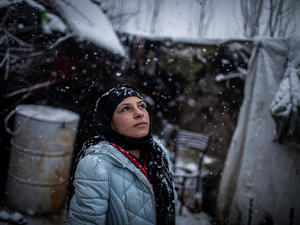Iraqi refugees return from Saudi Arabia
Iraqi refugees return from Saudi Arabia
29 July 2003
GENEVA - The first convoy of refugees returning to Iraq since the fall of the previous government left Saudi Arabia's Rafha camp this evening with more than 240 refugees headed for the southern Iraqi city of Basra, ending more than 12 years of exile.
The repatriation convoy, consisting of five buses carrying the mainly male Iraqi refugees, will travel along Saudi Arabia's northern desert overnight escorted by UNHCR and Saudi officials. It will transit Kuwait in the early hours of Wednesday and is expected to reach Basra later in the morning.
"Today's convoy marks the beginning of the end for Rafha refugee camp, a chance for long-time refugees to finally return to their homeland," said UNHCR Assistant High Commissioner Kamel Morjane.
Of the some 5,200 refugees in Rafha - the last of more than 33,000 who sought asylum in Saudi Arabia at the end of the 1991 Gulf war - so far more than 3,600 have registered to return to their homeland. Rafha's refugees began pressing to leave in April when the Saddam Hussein government fell, at times even holding sit-ins to pressure relief officials to organise their return as quickly as possible.
Today's convoy was organised by the UN refugee agency in close coordination with the Saudi and Kuwaiti governments and Iraq's Coalition Provisional Authority.
Aid workers described an atmosphere of excitement today in Rafha camp as five trucks bearing refugee belongings were loaded and the Iraqis shared their last meals with fellow refugees before bidding farewell and heading homewards.
"UNHCR is glad to see the first group of Iraqi refugees going home, but returns must be kept small and manageable for some time to come," Morjane added. "Due to security problems and the still fragile humanitarian and economic situation inside Iraq, we're only aiding those refugees who want to go back."
The UN refugee agency expects to help small numbers of refugees leave both Saudi Arabia and Iran over the coming months. Convoys from Rafha will depart every 10 days, with future movements already planned for Al Muthana, Dhi Qar, Najaf and Nasariya.
"We're very grateful for the unprecedented support Saudi Arabia has granted Iraqi refugees over the years and the recent contribution by Kuwait for our relief activities already underway in Iraq," Morjane said. "Their help is indispensable in finding solutions for these refugees."
Since the Iraqis first fled into Saudi Arabia in 1991, more than 25,000 were eventually resettled to third countries from Rafha and the nearby Artewiya camp, while 3,500 opted to return to Iraq in a series of small repatriation movements. Kuwait recently contributed $2 million to UNHCR's operations in Iraq.
In early August, the agency expects to begin small return convoys from Iran's Ashrafi camp, where already more than 200 refugees have registered to return, also bound for Basra and other areas of southern Iraq.
UNHCR now has staff posted throughout Iraq. With the change in government, the agency is able to accompany returning refugees back to their homes and will provide information to the hundreds of thousands of Iraqis still waiting in countries throughout the region.
As many as 500,000 Iraqi refugees could seek help to return to Iraq, with significant numbers expected in 2004. Iran hosts the single largest Iraqi refugee population, with more than 204,000.





